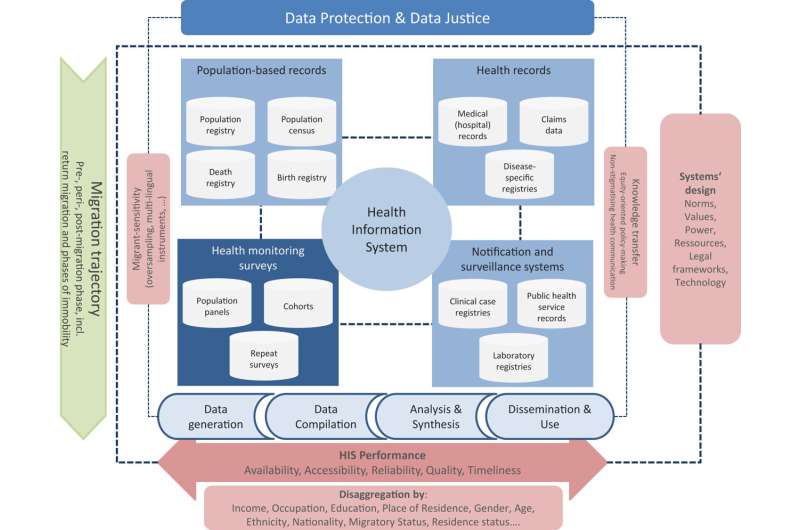This article has been reviewed according to Science X's editorial process and policies. Editors have highlighted the following attributes while ensuring the content's credibility:
fact-checked
peer-reviewed publication
trusted source
proofread
An action plan for better data on migration and health

Despite rising global mobility, the state of migrant and refugee health data in European health systems is a concern, a new study shows.
The analysis by an international coalition of universities, UN organizations, government representatives, and European institutions published in the journal The Lancet Regional Health Europe reveals that coverage of migrant and refugee data remains inconsistent and of suboptimal quality.
According to the study this issue is not due to a lack of knowledge or technological resources but rather arises from multiple political and structural factors at local, national, and European levels that hinder the effective implementation of existing guidelines. The coalition, led by Bielefeld University in Germany and Uppsala University in Sweden, proposes a roadmap for policy makers and European health systems to improve the situation.
"Migrant and refugee health data is more than just statistics. It's about human lives and well-being, but also of unnoticed inequalities if health needs go unmeasured," says Professor Dr. Kayvan Bozorgmehr. In his view health systems committed to inclusive and equitable health care need to ensure that migrants and refugees are not systematically excluded from data collection systems.
Bozorgmehr and his colleague Dr. Soorej Puthoopparambil from Uppsala University led the international coalition of authors including ten European universities, three national public health agencies, three Collaborating Centers of the World Health Organization, as well as several institutions and United Nations (UN) agencies such as the World Health Organization Regional Office Europe, the International Organization for Migration, and the United Nations Children's Fund (UNICEF).
The article was produced in the scope of The Lancet Migration European Hub's activities and published in the medical journal The Lancet Regional Health. The study reveals glaring gaps in including migrants and refugees in national data collection systems, which, according to the authors, hinder these groups from exercising their basic human rights and prevents the governments in creating inclusive and healthy societies.
One of the study's main conclusions is that the existing disparity in data collection reflects the low political priority given to this topic and the intricate governance challenges tied to migration and displacement.
In response to the identified shortcomings in current health information systems, the authors propose a roadmap to bridge the divide between knowledge and action. They propose four critical approaches for European health systems:
- Systematic data collection: Implement strategies that ensure migrant and refugee health data is collected, analyzed, and disseminated in a systematic manner, filling the existing gaps and informing evidence-based policy decisions.
- Privacy safeguards and data integration: Capitalize on methods that protect privacy while facilitating the linkage of data from various sources to generate comprehensive data at relatively low cost. This requires ensuring that the highest standards of data protection are upheld.
- Inclusive survey methods: Adopt methods that consider the diverse needs and backgrounds of migrant and refugee populations when conducting surveys.
- Empowerment through engagement: Engage migrants and refugees in decision-making about their health and health data. Their voices should shape the policies and practices that directly impact their lives.
The WHO European Region hosts approximately, 36 percent of the global international migrant population. The study stresses that health of migrants and refugees is a question that cannot be ignored.
"Countries need to move from ad-hoc to systematic approaches to pro-actively include migrants and refugees in health information systems, thereby promoting equity in health," says Soorej Puthoopparambil. This includes capitalizing on existing data sources while tapping new ones. The report proposes a change management approach to narrow the gap between knowledge and action, building a bridge towards health care policies and practices that are genuinely inclusive of migrants and refugees.
"In doing so, societies will not only promote the well-being of migrants and refugees, but will also better serve public health needs of their societies and promote equity in European health systems," says Kayvan Bozorgmehr.
More information: Kayvan Bozorgmehr et al, Integration of migrant and refugee data in health information systems in Europe: advancing evidence, policy and practice, The Lancet Regional Health—Europe (2023). DOI: 10.1016/j.lanepe.2023.100744




















